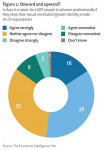Lack of digital identity authentication increases strategic and legal risks, study finds
The study, sponsored by IdenTrust, a global provider of identity solutions, reveals that nearly 60% of survey respondents fear the unauthorised use of proprietary or competitive information. A substantial number (39%) are also concerned about the reputational risk of brand hijacking, as often occurs when hackers commit cyber fraud. One-third of financial services companies say they need to tackle identity authentication primarily for legal reasons·for example, compliance with laws demanding that they properly identify customers, employees and/or contractors.
Although Internet-based digital certificates can prevent security risks (nearly one-half of all respondents already use them for e-commerce transactions), executives cite a variety of problems with existing certificates, many related to the inability of certificates to function beyond certain boundaries. The biggest disadvantage, say 44% of respondents, is that the certificates are not globally accepted. This is a significant drawback, given the large number of digital transactions that cross borders.
“As the global network of suppliers, customers and payments becomes increasingly complex, companies must be able to verify whom they are dealing with and be able to grant or deny them appropriate access to information and assets,” said Rama Ramaswami of the Economist Intelligence Unit, the editor of the report. “Digital authentication must be considered and executed at a strategic level.”
Other key findings of the report include the following:
· Many companies view identity authentication as a driver of business growth. About 45% of respondents say more effective identity authentication would enable their businesses to grow more rapidly over the next three years. Two-thirds of respondents say identity authentication is a priority for their companies because it can deliver business benefits (eg, expediting receipts) as well as strategic benefits (eg, facilitating entry into new markets).
· Companies expect to deal with more suppliers, more customers and more digital payments in the next three years. Fifty-six percent of respondents expect to use more suppliers in the next three years, and 20% expect the number of suppliers to increase by more than 20%. At the same time, 75% of respondents expect to be dealing with more customers, and 39% expect the customer population to be up by more than 20%. Thirty-one percent of respondents indicate that in the next three years, they will receive between 75% and 100% of their receivables electronically; another 21% of respondents expect to receive between 51% and 74% of payments electronically.
· Executives say that the ideal identity trust infrastructure would feature global, multi-party acceptance. Universal acceptance would enable global interoperability and reduce fraud risk. When asked to define the characteristics and benefits of a best-practice identity trust infrastructure, companies most often say digital signatures and credentials should be legally binding around the world (43%), should be able to guarantee multi-party, multi-bank transactions across borders (40%) and should provide a seamless experience for the user (30%).
“The growing incidence of online fraud and identity theft is forcing organisations to rethink the role that identity authentication plays in their broader security infrastructure,” said Andrea Klein, chief marketing officer for IdenTrust. “To ensure secure e-commerce, today’s organisations·which often conduct business across multiple borders·require a comprehensive, yet flexible, identity authentication infrastructure that is legally and technologically interoperable around the globe. Non-repudiation of all digitally signed documents and bank-backed liability limits are also critical to businesses focused on expanding e-commerce activities.”
Notes for editors:
Digital identity authentication in e-commerce is an Economist Intelligence Unit white paper, sponsored by IdenTrust. The research is based on an online survey of 246 executives, conducted by the Economist Intelligence Unit in January 2007. Forty-seven percent of the companies surveyed for this report had annual revenue of less than US$500m; 31%, between US$500m and US$5bn; and 22%, more than US$5bn.
About the Economist Intelligence Unit
The Economist Intelligence Unit is the business information arm of The Economist Group, publisher of The Economist. Through our global network of more than 700 analysts and contributors, we continuously assess and forecast political, economic and business conditions in 200 countries. As the world's leading provider of country intelligence, we help executives make better business decisions by providing timely, reliable and impartial analysis on worldwide market trends and business strategies.
About IdenTrust
IdenTrust is a leader in trusted identity solutions, recognised by financial institutions, government agencies and businesses around the world. IdenTrust enables organisations to effectively manage the risks associated with identity authentication. The only bank-developed identity authentication system, IdenTrust provides a legally and technologically interoperable environment for authenticating and using identities worldwide. The IdenTrust Trust Infrastructure is predicated on a proprietary framework that combines policies, legal framework, trusted operations and technology (P.L.O.T.) to create a comprehensive environment for issuing trusted identities. IdenTrust is the only company to provide a solution incorporating all four of these elements. Customer agreements are valid, binding and enforceable in more than 175 countries. IdenTrust identities are globally interoperable under uniform private contracts recognized in countries around the world. Additionally, the IdenTrust Trust Infrastructure maintains the privacy of each and every transaction processed by reading only digital certificate information, not the message itself. For more information, visit http://www.identrust.com.
웹사이트: http://www.eiu.com
연락처
Edgar Fernandez
Marketing Manager, Asia-Pacific
(852) 2585 3826 이메일 보내기
Fax: (852) 2802 7007
이 보도자료는 Economist Intelligence Unit가(이) 작성해 뉴스와이어 서비스를 통해 배포한 뉴스입니다. 뉴스와이어는 편집 가이드라인을 준수합니다.




